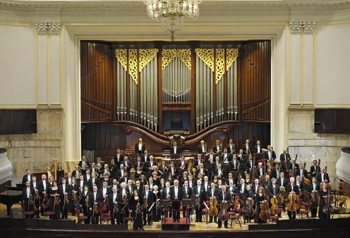Warsaw Philharmonic OrchestraThe Warsaw Philharmonic Orchestra
- オーケストラ
プロフィールProfile
The Warsaw Philharmonic Orchestra gave its first concert on 5 November 1901 at the newly built Philharmonic Hall. The Orchestra was conducted by Emil Młynarski, the Philharmonic’s co founder, first Music Director and Principal Conductor, while the soloist was Ignacy Jan Paderewski.
Even before World War I and in the interwar period, the Warsaw Philharmonic was the heart of Polish musical life and one of the most important musical institutions in Europe. In the first years after World War II, the Orchestra’s concerts would take place in theatres and sports halls. On 21 February 1955, a new building for the Philharmonic at Jasna Street was inaugurated, erected on the site of its former headquarters, which was destroyed during German airstrikes. On that day, the Warsaw Philharmonic received the title of a national institution.
Under the leadership of Witold Rowicki, the Orchestra regained its status as the leading symphony ensemble in Poland. In 1955–1958, it was Bohdan Wodiczko who held the position of Artistic Director, which he later handed over to Rowicki. In 1977, the position was taken over by Kazimierz Kord, and from 2002 to 2013, it was Antoni Wit who served as the Chief and Artistic Director of the Warsaw Philharmonic. From the 2013/2014 to the 2019/2020 season, the post of Artistic Director—responsible for the Ensembles’ development, the repertoire and selection of guest artists— was held by Jacek Kaspszyk, and he was followed by Andrzej Boreyko who was the Artistic Director until the end of the 2023/2024 season. As of 1 September 2024, Krzysztof Urbański took over this function.
Today, the Warsaw Philharmonic Orchestra enjoys worldwide popularity and acclaim. It has made over 150 concert tours on five continents, appearing in all of the world’s major concert halls and participated in many prestigious music events and international festivals. The Ensemble records for Polish Radio and TVP, as well as for Polish and foreign record labels and film companies. The Orchestra has frequently received prestigious awards, including a Grammy, Diapason d’Or, and Fryderyk award from the Polish Phonographic Academy. In 2016, the Orchestra also launched regular online streaming of selected concerts.
(January 2025)

